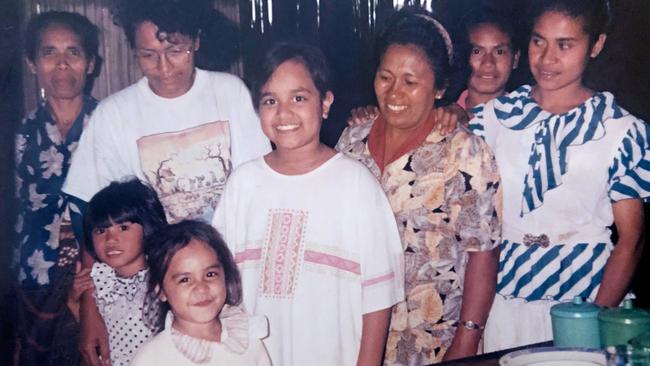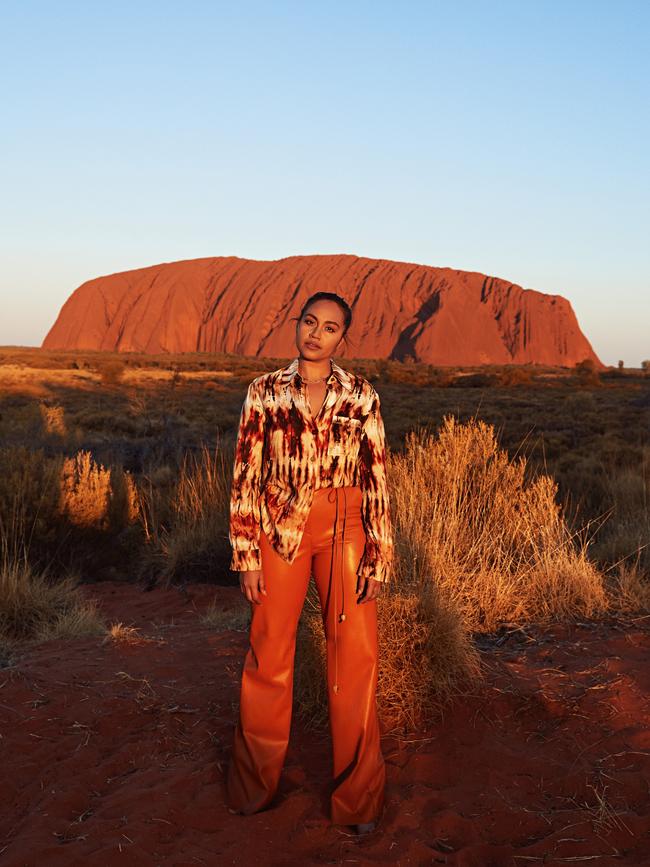Why Jess Mauboy supports the Uluru climbing ban
Singer Jessica Mauboy opens up on the family tragedy that inspired her upcoming album — and explains why touching Uluru “from its base” should be enough for people when visiting the famous rock.
Stellar
Don't miss out on the headlines from Stellar. Followed categories will be added to My News.
- Deborah Mailman and Claudia Karvan together again
- Rove McManus: ‘I’m sure I’ll find myself back on TV’
What’s in a name? For Jessica Mauboy, the answer is everything.
Not long ago, as she was thinking about what she wanted to say with her next album, the singer found herself consumed with writer’s block. So she began to write out her name on a sketchpad.
“I was sitting by myself one night [at home] and I kept thinking, ‘I need to go home to Darwin. People want me to write this record but I don’t know what to write,’” she tells Stellar.
“I started writing my name out: Jessica Mauboy. And then Jessica Hilda Mauboy. Then I kept writing Hilda in different styles.”
For a reason she could not quite understand at the time, Mauboy says, she intrinsically knew one thing. “It felt like ‘Hilda’ was the key.”
And so she set out on a quest to find out just why her mother, Therese, had bestowed the name of her grandmother, Hilda Mills, to her, the second youngest of the five Mauboy sisters.

Over cups of tea in the kitchen of their family home in Darwin, Mauboy gingerly asked her mum why she gave her that middle name. The immediate answer was simple — when she was born, Therese saw her mother’s face in her baby girl.
The history was much more complex, and in many ways tragic. It also opened a conversation that not only allowed the singer to discover her past, but even unlocked her writer’s block.
Mauboy and her mother spent hours talking about the life her nana led before it was cut short at the age of 36. Her granddaughter loved hearing about Hilda’s upbringing on a mission in the Queensland mining town of Mt Isa.
“What I have discovered has allowed me to embrace so much more about myself,” the 30-year-old tells Stellar.
“Learning about how she lived up on the mission with her seven brothers and sisters, living their culture, still singing traditional songs, doing traditional ceremonies, speaking language...”
The stories strengthened Mauboy’s connection to the Indigenous identity that stems from her mother’s Kuku Yalanji people in the rainforest regions of Far North Queensland.
But her heart also ached as her mother told of the Romeo and Juliet-like tale of the love affair between Hilda and her future husband Raymond Mills, and their fight to be together in the 1940s.
“This white Maltese man fell head over heels for Nana — and this was a time where there was still segregation by skin colour; their love was forbidden. That’s in my blood, that’s part of my story,” she says.
“Her family didn’t like Nana being with a white man. It brought them fear she would suffer, and they also worried she would lose their culture. He would sneak in to see her at night — he saw Nana for who she was, and loved her regardless of skin colour.”


Therese was only 10 when Hilda died, and Mauboy watched her carry the tragedy as she brought up five young women without a mother’s guidance and advice.
“I had to be sensitive talking to Mum about Nana; I could see instantly the pain as she tried to remember back to when she was 10,” says Mauboy, her eyes welling with tears as she explains the circumstances that led to her nana’s untimely death.
“There was a party and she was wearing a traditional grass skirt. It caught on fire from a heater and she went up in flames. They took her straight to the hospital, but the next night Nana discharged herself. She must have felt she was going... and she didn’t want to die there. Mum says she heard someone coming into the house and it woke her up,” continues Mauboy.
“She remembers going into Nana’s room and seeing her, she was badly burnt... she put on her nightgown. When Mum woke up the next morning, she had passed. I don’t think Mum has ever got over it. I don’t know how she could.”
FOR SEVERAL YEARS after her arrival on Australian Idol in 2006 at the age of 16, Mauboy found herself pinballing around the world to craft her music, thrust into speed date-style songwriting sessions with renowned hit-makers.
The results were consistent: Mauboy has four platinum albums to her name, went on tour with Beyoncé and is the winner of two ARIA Music Awards. But the ongoing goal of making radio-friendly pop hits rarely aligned with the private ambitions of the young female who wanted to sing her truth.
“When I have felt the bolts were tightened or made to feel my sh*t wasn’t right, you pretend you’re OK with it,” reveals Mauboy. “Then I’d go home and spend all night wondering why I had sabotaged myself, why I hadn’t spoken up.”

Which is why reconnecting with her family and her hometown has always been important for Mauboy.
In particular, it served as the fuel she needed to begin the newest chapter of her career and gave her the courage to dictate the course of her fourth studio album, which she decided to call Hilda.
This time around, Mauboy was adamant the songs on the track listing would need to be produced in Australia, with trusted collaborators and unlikely new creative companions. “The walls were down,” she says. “And I was never made to feel like I was wrong. Everyone was onboard.”
She worked with previous collaborators, but for the Hilda sessions she also teamed up with new writers — several of them women, which she says had a profound effect on her confidence.
“They pushed me and encouraged me to say what I mean and I never had that in a lot of creative studio moments,” she says. “The guys are understanding and encouraging — but the girls were like, ‘Sing it like you just said it!’”
Her sounding board, long-term partner Themeli Magripilis, was another integral member of Team Jess during the making of the album.


He gave her feedback on every song, from the deeply emotional ‘Just Like You’ — dedicated to both her father and her lover — through to the cheeky ‘Jealous’.
Mauboy says he has a natural appreciation for songwriting; his lifelong exposure to his family’s construction business means he knows how to build something from scratch, and make it beautiful and strong.
“It’s amazing how much he gets excited about me bringing home new music. He is an only son, and having watched his relationship with his mum and dad, even at the beginning of our relationship, I realised he’s so giving.”
Ahead of Hilda’s release, Mauboy once again headed back to the Northern Territory alongside Stellar for a special excursion to Uluru, the physical and spiritual heart of Australia.
The trip gave her an opportunity to explore the rock and its stories like she had with her mother, to show respect for the Anangu people of that land and to learn more about their culture.
MORE STELLAR:
The untold story of Libby Trickett’s retirement
I keep choosing the wrong guy. How do I change?
Upon arriving, Mauboy and the Stellar team went for a bike ride around the rock. “We were really quiet; all you could hear was the gust of wind howling around the rock. I felt like it was telling me a story,” she recalls.
The ban on climbing Uluru comes into effect later this month (October 26), coinciding with the 34th anniversary of the return of Uluru to its traditional owners. Mauboy tells Stellar she wholeheartedly supports the move.

“The last day we went back and the conversation about closing the walk up the rock was happening,” she says.
“When you consider the power of this rock and its history... why doesn’t it make sense to people? You can’t deny the feelings you have standing there and it haunts me that this is even an argument. Touch the rock from its base and you will feel everything you need to feel.”
Shooting at the sacred site also gave Mauboy a chance to get her bare feet back on red dirt, a simple act that has long kept her physically and symbolically grounded.
“The dirt and the heat I feel coming up through the ground has always affected me,” she says. “The smell, the texture — all of it — makes me feel grounded, awake and present. The only reason I can walk in the heels I wear when I’m working is because I know how solid that ground is.”
Hilda is out on October 18. To pre-order Hilda, click here.
Shot on location at Uluru-Kata Tjuta National Park in the Northern Territory. Stellar was supported by Tourism NT and Parks Australia. For more information, visit northernterritory.com/uluru.
